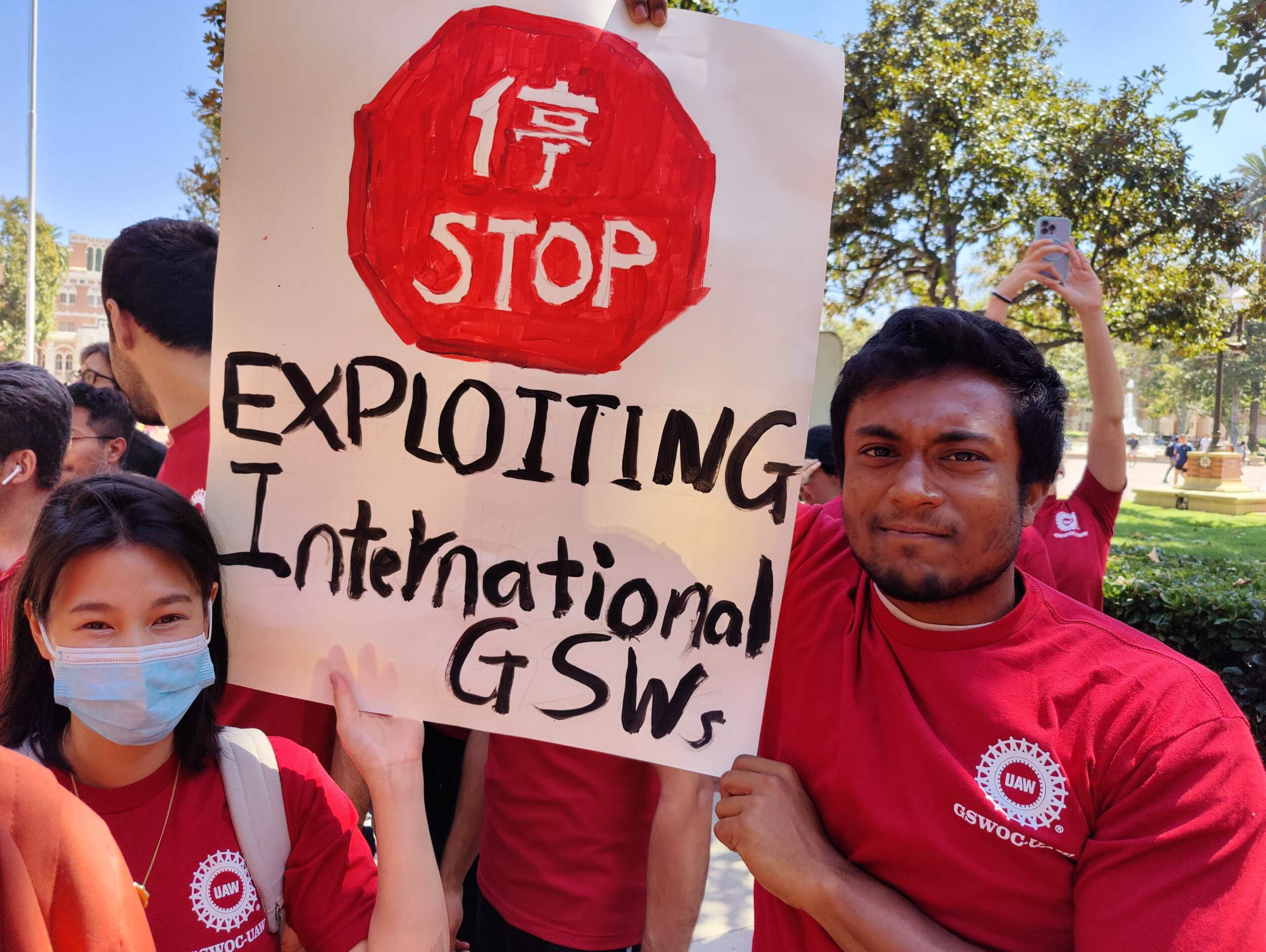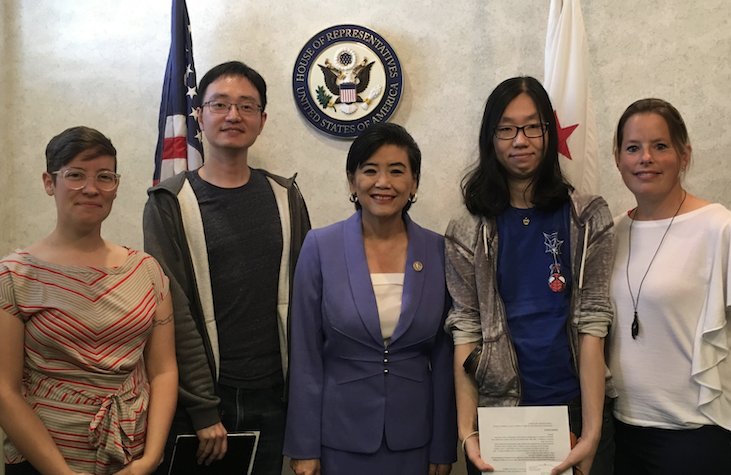Support for International Students
What Difference Does Unionization Make for International Students?
Forming a Union is one of the most important things we can do to ensure that all International Students are successful. International students can face multiple unique challenges: misinformation and uncertainty about rules and regulations, an unwelcoming political environment, and challenging working conditions. By unionizing we will be able to bargain for improvements that become part of a legally binding contract. We also create a community so we don’t have to face problems alone and gain a stronger voice at USC and in the national landscape.
International Students Have the Same Legal Rights to Join a Union as US Citizens
Under US law, graduate student employees doing teaching or research work at USC are employees regardless of citizenship status. This means we have the legal right to form unions and bargain with the University as equals. In fact, tens of thousands of International Students are already members of academic unions like UAW 2865, the Union of TAs, Tutors, and Readers at the University of California, UAW 4121, the Union of Academic Student Employees and Postdocs at University of Washington, and HGSU-UAW 5118, the Harvard Graduate Students Union.

“I’m a PhD student and teaching assistant in Mathematics. My research interest is in stochastic processes. I believe in unionizing because I think having a union can protect our rights to have a safe working environment and fair compensation for our labor. Even if I’m not in need right now, I can empower my fellow grad student workers who are in need. And when I face discrimination or unfair treatment, I will know that my coworkers have my back.” – Bixing Qiao, Mathematics
International Student Unionization is Part of a Larger Movement in the US
Over 100,000 academic employees—many of them not US citizens—are already members of the same union we are planning to join (UAW). Through doing so, student employees have won important improvements like higher wages, better medical coverage, protections from unjust termination, and more.
In addition, through unionizing international academic employees have:
-
- Formed support networks to build community to help one another adapt to living in the US. This includes providing accurate information about changing US immigration policy (like hosting information sessions with immigration attorneys).
- Worked for better US immigration policy, like increasing access to Optional Practical Training (OPT), opposing the “Fixed Duration of Status” rule, and working with members of congress Judy Chu (San Gabriel Valley) and Pramila Jayapal (Seattle) to oppose the 1-year period of validity for Chinese entry visas. The Western States International Working group, made up of international UAW members from across the west coast, created this list of priorities for ongoing lobbying efforts.
- Used collective bargaining to address issues in the workplace that especially impact international scholars, like winning guaranteed vacation days, protecting the right to work from abroad during COVID-19, and protecting visa-holders from unjust termination.
- Formed support networks to build community to help one another adapt to living in the US. This includes providing accurate information about changing US immigration policy (like hosting information sessions with immigration attorneys).

UAW Local 2865 and UAW 5810 union members with Congresswoman Judy Chu discussing her Dear Colleague Letter in support of Chinese international students at her office in Pasadena, 2018.
Your Title Goes Here
Your content goes here. Edit or remove this text inline or in the module Content settings. You can also style every aspect of this content in the module Design settings and even apply custom CSS to this text in the module Advanced settings.
Can I join a union in the United States if I am here on a student visa?
Every international graduate student, regardless of national origin or type of visa, has the right to join a union. Under US law, graduate student employees doing teaching or research work at USC are employees regardless of citizenship status. This means we have the legal right to form unions and bargain with the University as equals. In fact, tens of thousands of International Students are already members of academic unions like UAW 2865, the Union of TAs, Tutors, and Readers at UC, UAW 4121, the Union of Academic Student Employees and Postdocs at University of Washington, and HGSU-UAW 5118, the Harvard Graduate Students Union.
Graduate employees have formed unions and bargained contracts at many schools, and graduate employee unions have existed for almost 40 years. No unionized academic employee has ever reported any complications arising from being both an international student and a unionized employee. It is against the law for your employer (USC) to discriminate against you on the basis of your union membership or participation in legal union activities.
Are there any restrictions on political activity by international students?
All international students enjoy the same rights to freedom of expression and freedom of association as U.S. nationals. Federal law protects your right to join a union.
However, students on visas are prohibited from making financial donations to political candidates and political parties under federal law. That said, many international students contribute by volunteering time. For example, international students have joined for canvassing, phonebanking, and meetings with elected officials.
Will signing a union card affect visa or permanent residency applications that I may make in the future?
All international student employees have the same right to join and participate in unions as US permanent residents and citizens. Out of tens of thousands of international students, Postdocs, and researchers that are part of UAW, there has never been any reported instances of participation in a union negatively impacting visa or permanent residency applications.
“I do research in the field of psycholinguistics. As an international student, I feel unionization is critical to the protection of our rights. International TAs often face a lot of pressure while teaching and researching in a new culture and academic environment. I believe that a union will ensure that international TAs have the same fair treatment and respect. Another reason why I support unionization is that a union enables us to bargain more effectively with the university.” – Jun Lyu, Linguistics
“I am an international student worker in the Slavic Languages and Literatures department, and I study contemporary Russian literature and memory studies. During the Covid-19 pandemic my colleagues and I were told by the university that we were not allowed to teach online from our home countries, even though many other universities accommodated their international student workers who could teach from abroad. This forced many of my colleagues to take a year off their fellowship, potentially affecting their progress towards the completion of their dissertation. While USC gave faculty an extra year towards their tenure, similar privileges were not extended to graduate student workers. I support unionization because having a student worker union will allow us to advocate collectively for international student worker rights and end policies that discriminate against international student workers at USC.” – Dmitrii Kuznetsov, Slavic Languages and Literatures
